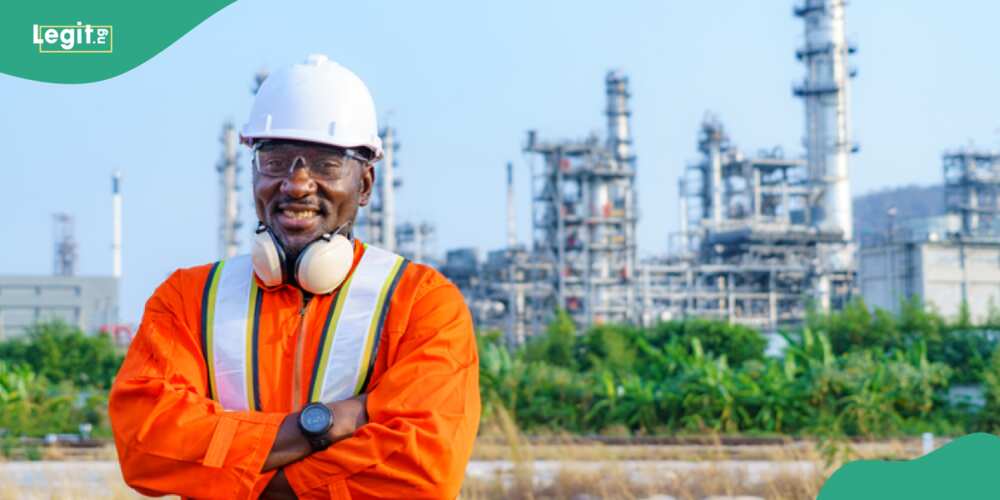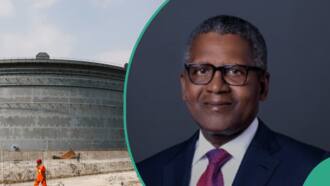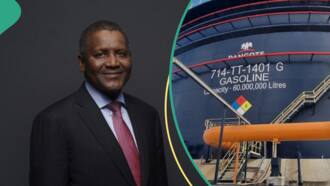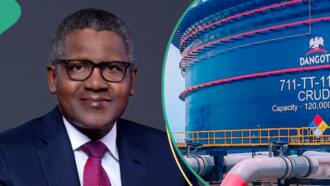- Nigeria’s oil and gas industry depends heavily on Nigeria, the largest oil producer in Africa, and its numerous refineries
- Apart from the Dangote Petroleum Refinery with the largest capacity in Africa, Nigeria also boast other refineries across different regions
- Other refineries in the country include Dangote Refinery, Kaduna Refinery, old and new Port-Harcourt Refinery, among others
Legit.ng journalist Zainab Iwayemi has over 3-year-experience covering the Economy, Technology, and Capital Market.
Nigeria, the biggest oil producer in Africa, has several refineries that are essential to the nation’s oil and gas industry.

Source: Getty Images
To lessen the excessive reliance on imported refined products, these facilities have been renovated and upgraded over time.
The locations, capacities, and most recent advancements of Nigeria’s refineries are highlighted extensively:
Dangote Refinery
The 650,000 barrels per day (BPD) Dangote Petroleum Refinery is an integrated refinery project located in the Lekki Free Zone, close to Lagos, Nigeria.
The refinery was commissioned in May 2023 and cost about $19 billion. Oil refining began in late December 2023, and by early May 2024, products were being distributed to both domestic and foreign markets.
Kaduna Refinery
The Kaduna Refining and Petrochemical Company refinery, built in 1980 at a cost of $525 million, has an initial capacity of 50,000 barrels per day (bpd) and supplies petroleum products to Northern Nigeria.
The capacity was doubled to 100,000 bpd in 1983 with the addition of a second 50,000 bpd crude plant intended only for producing lubricating oils. The first crude unit’s capacity was further raised to 60,000 bpd by 1986. With these additions, the refinery’s maximum capacity is now 110,000 bpd.

Read also
“We are delighted to confirm”Energy firm resumes operation in Nigeria, details of location emerges
Old Port-Harcourt refinery
With a daily capacity to refine 60,000 barrels of oil, the first refinery in Port Harcourt was built and put into service in 1965. Approximately £12 million was invested in its construction by Shell BP then.
Throughout the 1990s, the refinery’s output gradually decreased after initially operating at over 50% of its designed capacity.
The refinery’s mechanical completion and flare startup were announced by Senator Keineken Lokpobiri, the Minister of Petroleum Resources, in December of last year.
New Port-Harcourt Refinery
After spending $850 million on construction, the federal government opened the New Port Harcourt refinery in 1985 with a total of 150,000 barrels of oil.
The total refining capacity of the Port Harcourt plants grew to 210,000 barrels per day with the commissioning of the New Port Harcourt refinery.
Warri Refinery and Petrochemical Company (WRPC)
Established in 1978, this refinery is situated in Warri, Delta State, Nigeria. Warri refinery is a sophisticated conversion refinery that can produce 125,000 barrels per day of nameplate distillation.

Read also
Dangote sets another record as his refinery’s electricity surpasses Nigeria’s eleven years capacity
A petrochemical facility with 18,000 MA of carbon black and 13,000 MTA of polypropylene manufacturing capacity was put into service in 1988 and is part of the refinery complex. The refinery provides goods to markets in Nigeria’s southwest and south.
Waltersmith Refining and Petrochemical Company
The Walter Smith refinery, which can process 5,000 barrels of oil per day, is located in Imo State. The refinery started operations in 2020 and plans to expand its capacity to 50,000 bpd in the future years.
Azikel Refinery
The Azikel refinery, under construction in Yenogia, Bayelsa state is the nation’s first privately developed hydro-skimming refinery.
A total of 12,000 barrels per day will be produced at the new refinery. Together with a few byproducts, it will refine Gbarain condensate and Bonny Sweet light crude to create premium petroleum products.
Ogbele Refinery
Beginning as a 1,000 BOPD topping plant in 2012, the Ogbele refinery facility produced 85,860 liters of diesel per day from 540 BOPD of oil.

Read also
Dangote refinery scores another milestone, ships fuel to Singapore, assures of petrol supply in July
Near the end of 2019, a second train with 5,000 BOPD was installed. It can produce diesel, marine diesel, DPK, naphtha, and high pour fuel oil.
Edo Refinery and Petro Chemical Company
AIPCC Energy is the owner of the Edo Refinery. After commissioning, it operates in two phases and has a capacity of 1,000 BPSD and 5,000 BPSD.
With a capacity of 12,000 BPD, phase 2 construction is well underway, with full operation expected to start in 2024.
Duport Midstream
DUPORT Midstream Company Limited, DMCL, is the operator of this 2,500 bpd modular refinery, which is situated in Egbokor, Orhionmwon Local Government Area, Edo State.
Niger Delta Petroleum Refinery (Aradel):
This modular refinery comprises three trains and 11,000 barrels. Its products include automotive gas oil, dual-purpose kerosene, marine diesel oil, high-pour fuel oil, and naphtha.
OPAC Refinery, Delta state
This 10,000-bpd modular refinery in Kwale, Delta state, was completed by the federal government in 2021 as part of a strategy to improve regional crude oil refining.
Alexis Refinery Limited
The project is a 10,000 BPD facility that will be built in stages. 2,500 BPD of locally accessible crude will be processed in the first phase, which is presently under development, to create AGO, naphtha, and fuel oil along with fuel gas output.
Atlantic International Refineries and Petrochemical Limited
The Nigerian Content Development and Monitoring Board declared in 2021 that a 2,000 bpd modular refinery would be built in Brass, Bayelsa State.
According to NCDMB, Atlantic International Refinery and Petrochemical Limited is working with the Board in cooperation to create the modular refinery.
2 Nigerian refineries get ready to begin operation
Legit.ng reported that according to Ifeanyi Ubah, the chairman of the Senate Committee on Petroleum (Downstream), two refineries in Nigeria would be fully operating this year, following a prolonged period of gasoline scarcity in the country.
According to Ubah, turnaround work is now being carried out at the refineries in Port Harcourt and Warri, and they will resume operations on schedule.
The senator stated that preparations were already underway to meet the goal and that the Kaduna Refinery will be operational by the end of 2025.
Source: Legit.ng


